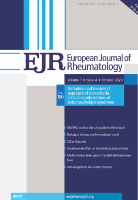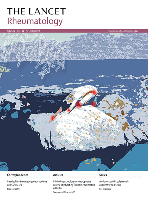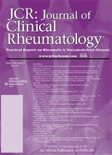
European Journal of Rheumatology
Scope & Guideline
Fostering Collaboration for a Healthier Future
Introduction
Aims and Scopes
- Clinical Research in Rheumatology:
The journal publishes a wide array of clinical studies focusing on the diagnosis, treatment, and management of rheumatic diseases, including systemic lupus erythematosus, rheumatoid arthritis, and spondyloarthritis. - Immunology and Autoimmunity:
A significant focus is on the immunological aspects of rheumatic diseases, exploring the mechanisms of autoimmunity, immune system interactions, and the role of immune therapies. - Innovative Treatment Approaches:
The journal highlights research on novel therapeutic strategies, including biologic and targeted therapies, and their efficacy in managing rheumatic conditions. - Epidemiology and Public Health:
Studies addressing the epidemiological aspects of rheumatic diseases, including prevalence, risk factors, and the impact of public health interventions on patient outcomes are key components of the journal's scope. - Quality of Life and Patient-Reported Outcomes:
Research examining the quality of life, psychosocial factors, and patient-reported outcomes in individuals with rheumatic diseases is emphasized, reflecting a holistic approach to patient care.
Trending and Emerging
- Impact of COVID-19 on Rheumatic Diseases:
Research examining the effects of COVID-19 on patients with rheumatic diseases has surged, addressing both the impact of the virus and the implications for treatment during the pandemic. - Biologic and Targeted Therapies:
There is a growing emphasis on studies evaluating the efficacy and safety of biologic and targeted therapies in a variety of rheumatic conditions, reflecting advancements in treatment options. - Psychosocial Aspects of Rheumatic Diseases:
An increased focus on the psychosocial factors affecting patients, including mental health issues and quality of life assessments, is emerging as a crucial area of research. - Multidisciplinary Approaches to Care:
Research advocating for multidisciplinary care models, including collaboration between rheumatologists, primary care providers, and other specialists, is gaining traction. - Longitudinal Studies on Disease Progression:
There is an upward trend in longitudinal studies that track disease progression and treatment outcomes over time, providing valuable insights into the long-term management of rheumatic diseases.
Declining or Waning
- Traditional Pharmacotherapy Studies:
There has been a noticeable decrease in studies focused solely on traditional medications such as NSAIDs and conventional DMARDs, as the field shifts towards biologics and targeted therapies. - Basic Science Research without Clinical Relevance:
Research that does not translate into clinical applications or lacks direct relevance to patient care has become less frequent, reflecting a trend towards more clinically applicable findings. - Single-Center Case Reports:
The frequency of single-center case reports has declined, indicating a preference for larger, multi-center studies that provide broader insights into rheumatic disease management.
Similar Journals

Lancet Rheumatology
Unveiling the latest breakthroughs in rheumatological research.The Lancet Rheumatology, published by Elsevier, is a premier academic journal dedicated to advancing the understanding of rheumatology and immunological diseases. Launched in 2019, this esteemed publication has quickly become a leading source of research, achieving an impressive Q1 ranking in both the fields of Rheumatology and Immunology as of 2023. With Scopus rankings placing it at #2 out of 73 in Medicine - Rheumatology and #6 out of 233 in Medicine - Immunology and Allergy, the journal serves as an essential platform for disseminating high-quality, peer-reviewed articles that address the latest findings and clinical practices in these domains. The journal, accessible in print and online, is committed to fostering knowledge and collaboration among researchers, healthcare professionals, and students alike, making it an invaluable resource for those seeking to deepen their expertise in rheumatology and its interrelated fields.

Reumatismo
Empowering healthcare through innovative rheumatology insights.Reumatismo is a distinguished Open Access journal dedicated to the field of rheumatology, published by PAGEPRESS PUBL since 2001. With a rich history dating back to 1952, this journal has been pivotal in disseminating vital research on rheumatic diseases and related disorders. Based in Italy, Reumatismo has earned a reputation for its quality and relevance, achieving a Q3 category ranking in the 2023 Scopus metrics for Rheumatology, reflecting its significant contributions to the field. The journal is committed to providing a platform for the latest scientific developments and clinical innovations, thus aiding researchers, healthcare professionals, and students striving to enhance understanding and treatment of rheumatic conditions. For those seeking to access comprehensive research articles and studies, Reumatismo boasts an open access policy, ensuring that knowledge is freely available to all, fostering collaboration and advancement in rheumatology worldwide.

Current Rheumatology Reviews
Exploring breakthroughs in rheumatology advancements.Current Rheumatology Reviews is an esteemed journal dedicated to publishing comprehensive reviews on advancements in the field of rheumatology. Established by Bentham Science Publishers, this journal has become a vital resource for researchers, clinicians, and students seeking to stay abreast of the latest developments and therapeutic strategies from 2006 to 2024. Located in the United Arab Emirates, it caters to a global audience, delivering insights that have been pivotal in shaping clinical practices. With an impact factor reflective of its Q3 status in Rheumatology by 2023, the journal ranks #46 out of 73 in the Scopus database, positioning it in the 37th percentile in the discipline. Although it operates without open access, its high-quality content ensures that each article undergoes rigorous peer review, making the Current Rheumatology Reviews a trusted platform for disseminating critical research findings and reviews that drive forward the understanding and treatment of rheumatic diseases.

International Journal of Rheumatology
Fostering excellence in rheumatology through open access.The International Journal of Rheumatology, published by HINDAWI LTD, serves as a vital resource for researchers and practitioners in the fields of rheumatology and immunology. Since its inception in 2009 as an Open Access journal, it has aimed to disseminate high-quality, peer-reviewed research to foster advancements in the understanding and treatment of rheumatic diseases. With an ISSN of 1687-9260 and E-ISSN of 1687-9279, the journal has become increasingly relevant, achieving a respectable Q3 ranking in both the Immunology and Rheumatology categories in 2023, and earning a Scopus rank of #27 out of 73 in Medicine Rheumatology. The journal's commitment to excellence is reflected in its wide-ranging scope, addressing current trends and innovations through empirical studies, reviews, and clinical insights. Its global readership, based in the United States and beyond, highlights the journal's importance in shaping the discourse within rheumatological research. As it converges through the years from 2010 to 2024, the International Journal of Rheumatology continues to be a cornerstone for sharing groundbreaking findings and fostering collaboration in the rheumatic disease community.

CURRENT OPINION IN RHEUMATOLOGY
Connecting Researchers with Pioneering DiscoveriesCurrent Opinion in Rheumatology, published by Lippincott Williams & Wilkins, stands as a vital resource in the field of rheumatology. Since its inception in 1989, this prestigious journal has been at the forefront of disseminating cutting-edge research, with a notable Q1 ranking in the 2023 Rheumatology category and an impressive Scopus rank of 7 out of 73, placing it in the 91st percentile. The journal's commitment to presenting insightful reviews and critical analyses of recent advancements and treatment strategies makes it an essential read for professionals, researchers, and students dedicated to the study of rheumatic diseases. Although not an open-access journal, Current Opinion in Rheumatology continues to foster an informed dialogue within the academic community through its high-impact content, ensuring that the latest developments and practices are accessible to those at the vanguard of rheumatology research.

Rheumatology and Therapy
Bridging research and patient care in rheumatic diseases.Rheumatology and Therapy, published by Springer, stands as a prominent open-access journal within the fields of Immunology and Allergy and Rheumatology. Since its inception in 2014, the journal has made significant contributions to advancing the understanding, diagnosis, and treatment of rheumatic diseases, garnering a solid reputation with an impact factor that reflects its rigorous peer-review process and scholarly influence. Currently ranked in the Q2 quartile for both its categories according to 2023 metrics, it occupies a significant position among its peers, standing at Rank #21 out of 73 in Medicine Rheumatology and Rank #101 out of 233 for Medicine Immunology and Allergy. The journal's scope encompasses cutting-edge research, reviews, and clinical studies that aim to bridge the gap between laboratory findings and patient care, making it an invaluable resource for researchers, clinicians, and students alike. With its commitment to open access, Rheumatology and Therapy ensures that high-quality research is available to a global audience, fostering collaboration and innovation in rheumatology and immunology. To learn more, visit their official site and explore the wealth of knowledge available.

Revista Cubana de Reumatologia
Fostering innovation in the management of rheumatic conditions.Revista Cubana de Reumatologia is a prominent open-access journal published by the SOC CUBANA REUMATOLOGIA, dedicated to advancing knowledge in the field of rheumatology since its inception in 1998. With an ISSN of 1606-5581 and an E-ISSN of 1817-5996, this journal aims to disseminate high-quality research that addresses various aspects of rheumatic diseases, their diagnosis, treatment, and management. Located in Havana, Cuba, the journal serves as a vital platform for both local and international researchers, professionals, and students interested in the latest developments within the specialty. By embracing an open-access policy, the journal ensures that groundbreaking studies are freely available to a global audience, fostering collaboration and innovation in rheumatological research. As the field continues to evolve, Revista Cubana de Reumatologia remains committed to addressing the emerging challenges and trends, making it an essential resource for practitioners and scholars alike.

Pediatric Rheumatology
Empowering healthcare with innovative insights in pediatric rheumatology.Pediatric Rheumatology is a leading peer-reviewed open access journal published by BMC, dedicated to disseminating high-quality research in the field of pediatric rheumatology. Since its inception in 2007, the journal has established itself as a vital resource for healthcare professionals, researchers, and students focused on pediatric immunology, rheumatology, and child health, maintaining an impressive Q1 ranking in Pediatrics and Q2 in Immunology and Allergy as well as Rheumatology for 2023. It is recognized for its impact on advancing knowledge and clinical practice, with significant contributions noted in various studies and case reports. With access options that embrace the ethos of open science, all articles published in Pediatric Rheumatology are freely available, promoting collaborative research and discussion among practitioners across the globe. The journal welcomes submissions that encapsulate innovative research, clinical trials, and reviews that address both current challenges and advancements within the pediatric rheumatology landscape.

JCR-JOURNAL OF CLINICAL RHEUMATOLOGY
Connecting Clinical Excellence with Research RigorJCR-Journal of Clinical Rheumatology, published by Lippincott Williams & Wilkins, is a premier outlet dedicated to the field of rheumatology, recognized for its contributions and relevance among medical journals. Boasting an impact factor reflective of its vital role in disseminating innovative research, it currently holds a Q2 category ranking in Medicine (miscellaneous) and a Q3 ranking in Rheumatology as of 2023. With its convergence years spanning from 1995 to 2024, the journal aims to foster the advancement of knowledge in clinical practices, therapeutic advances, and patient management strategies concerning rheumatic diseases. Researchers, professionals, and students can access a wealth of benchmark studies and peer-reviewed articles, enhancing their understanding and collaboration within this dynamic field. By bridging clinical insights with rigorous research, the JCR-Journal of Clinical Rheumatology remains an important resource for advancing the understanding of rheumatologic disorders and improving patient care.

Reumatologia Clinica
Transforming knowledge into practice in rheumatic health.Reumatologia Clinica is a distinguished journal dedicated to the field of Rheumatology, published by Elsevier España SLU. With its ISSN of 1699-258X and E-ISSN 1885-1398, the journal aims to disseminate pivotal research findings and clinical studies from 2005 to 2024, spotlighting advancements in the understanding and treatment of rheumatic diseases. Based in Barcelona, Spain, it plays a vital role in the academic community, ranking in the Q3 category for Rheumatology as of 2023, with a Scopus ranking of #44 out of 73, placing it in the 40th percentile. Although it operates under a traditional access model, the journal is committed to academic excellence, providing researchers, healthcare professionals, and students with invaluable insights that drive the field forward. Reumatologia Clinica serves as an essential resource for those looking to deepen their knowledge and contribute to the evolving landscape of rheumatologic research.